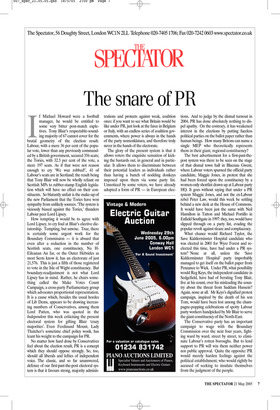The snare of PR
If Michael Howard were a football manager, he would be entitled to some very bitter post-match expletives. Tony Blair’s respectable-sounding majority of 67 cannot cover for the brutal geometry of the election result. Labour, with a mere 36 per cent of the popular vote, lower than any previously commanded by a British government, secured 356 seats; the Tories, with 32.3 per cent of the vote, a mere 197 seats. As if that were not reason enough to cry ‘We wuz robbed!’, 41 of Labour’s seats are in Scotland; the result being that Tony Blair will now be wholly reliant on Scottish MPs to rubber-stamp English legislation which will have no effect on their constituents. So blatantly unfair is the make-up of the new Parliament that the Tories have won sympathy from unlikely sources. ‘The system is viciously biased against the Tories,’ thunders Labour peer Lord Lipsey.
How tempting it would be to agree with Lord Lipsey, to cry foul at Blair’s elective dictatorship. Tempting, but unwise. True, there is certainly some urgent work for the Boundary Commission — it is absurd that even after a reduction in the number of Scottish seats, one constituency, Na HEileanan An Iar, or the Outer Hebrides as most Scots know it, has an electorate of just 21,576. This is just a fifth of those registered to vote in the Isle of Wight constituency. But boundary-readjustment is not what Lord Lipsey has in mind. Rather, he chairs something called the Make Votes Count Campaign, a cross-party Parliamentary group which advocates proportional representation. It is a cause which, besides the usual hordes of Lib Dems, appears to be drawing increasing numbers of Conservatives, among them Lord Patten, who was quoted in the Independent this week criticising the present electoral system for gifting Blair ‘crazy majorities’. Even Ferdinand Mount, Lady Thatcher’s sometime chief policy wonk, has leant his weight to the campaign for PR.
No matter how hard done by Conservatives feel about the election result, PR is a concept which they should oppose strongly. So, too, should all liberals and lefties of independent voice. The classic, and so far unanswered, defence of our first-past-the-post electoral system is that it favours strong, majority adminis trations and protects against weak, coalition ones: if you want to see what Britain would be like under PR, just look at the farce in Belgium or Italy, with an endless series of coalition governments, where power is always in the hands of the party nomenklatura, and therefore truly never in the hands of the electorate.
The glory of the present system is that it allows voters the exquisite sensation of kicking the bastards out, in general and in particular. It allows them to discriminate between their potential leaders as individuals rather than having a bunch of nodding donkeys imposed upon them via some party list. Unnoticed by some voters, we have already adopted a form of PR — in European elec tions. And to judge by the dismal turnout in 2004, PR has done absolutely nothing to dispel apathy. On the contrary, it has weakened interest in the elections by putting faceless political parties on the ballot paper rather than human beings. How many Britons can name a single MEP who theoretically represents them in their giant, regional constituency?
The best advertisement for a first-past-thepost system was there to be seen on the stage of that dismal town hall in Blaenau Gwent, where Labour voters spurned the official party candidate, Maggie Jones, in protest that she had been forced upon the constituency by a women-only shortlist drawn up at Labour party HQ. It goes without saying that under a PR system Maggie Jones, and not the ex-Labour rebel Peter Law, would this week be settling behind a new desk at the House of Commons. It would have been just the same with Neil Hamilton in Tatton and Michael Portillo in Enfield Southgate in 1997: they, too, would have slipped through on a party list, evading the popular revolt against sleaze and complacency.
What chance would Richard Taylor, the Save Kidderminster Hospital candidate who was elected in 2001 for Wyre Forest and reelected this time, have had under a PR system? None at all, unless the ‘Save Kidderminster Hospital’ party improbably managed to get itself on the ballot paper from Penzance to Wick. Under PR, what possibility would Reg Keys, the independent candidate in Sedgefield, have had of berating Tony Blair, live at his count, over his misleading the country about the threat from Saddam Hussein? Again, none at all. Mr Keys’s dignified protest campaign, inspired by the death of his son Tom, would have been lost among the champagne-popping celebrations of spotty Labour party workers handpicked by Mr Blair to serve the giant constituency of the North-East.
The Conservative party has an important campaign to wage with the Boundary Commission over the next four years, fighting ward by ward, street by street, to eliminate Labour’s rotten boroughs. But to lend support to PR will win them neither power nor public approval. Quite the opposite: PR would merely harden feelings against the political establishment, who would rightly be accused of seeking to insulate themselves from the judgment of the people.

























































 Previous page
Previous page